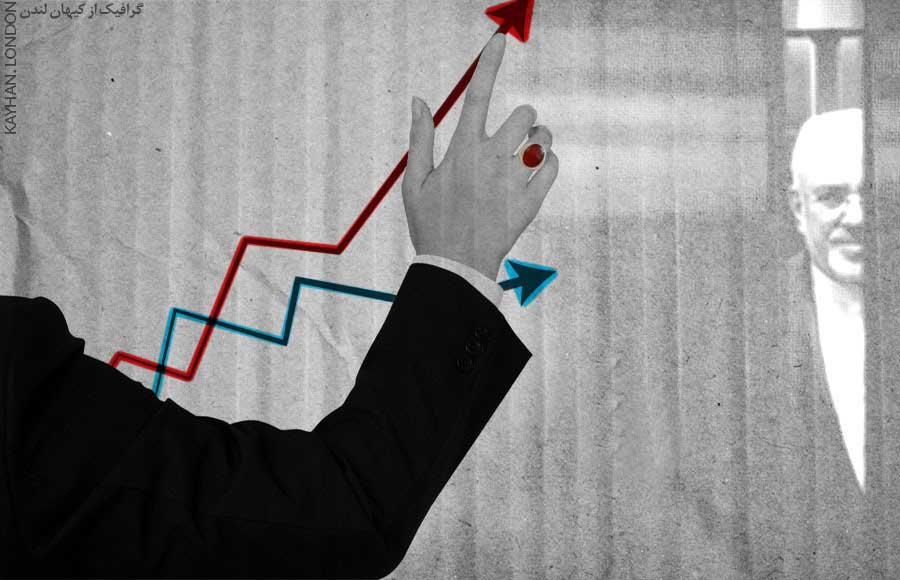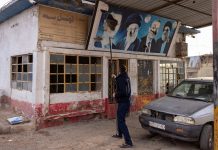By Ahmad Rafat
On Feb. 24, the University of Maryland’s School of Public Policy Center for International and Security Studies (CISSM) published a study titled “Iranian Public Opinion in the Biden Era,” which, according to the university, was “based on two consecutive waves of nationally representative surveys that were conducted in Iran by IranPoll for the University of Maryland.”
IranPoll, which partially sponsored data collection in the survey, is a Toronto-based “independent private full-service public opinion research company focusing only on Iran.”
CISSM designed the questionnaires and “collected feedback on the survey from relevant policy experts and practitioners, performing the analysis, and putting together the report.”
Two days after the survey was published, the Tehran-based hardline Kayhan newspaper’s front-page headline read: “Maryland University Opinion Poll Showed 75 Percent of People Support Majlis’ [Iranian Parliament] Bill to Bypass Sanctions.”
The editorial highlighted one of the survey’s findings: that most respondents believed that while President Joe Biden will adopt a more conciliatory approach towards Tehran than his predecessor Donald Trump, the overall U.S. policy on Iran will not change much.
The CISSM did not publish the list of questions put to the Persian speakers. IranPoll has published all the questions, findings, and conclusions in English, which shows that their intended audiences are Western governments and societies.
There are some questions about who designed the survey. It is also curious that its publication coincided with the possibility of talks between Tehran and Washington and that most questions reflected the Islamic Republic’s views on reviving talks with the U.S.
This is not the first time Iran has cited CISSM and IranPoll to legitimize its arguments in the international arena. It is not surprising that the survey’s findings portray the Islamic Republic in a good light, given the background of some people who manage the projects at these institutions.
One of the principal members of CISSM is Ebrahim Mohseni, a research associate at CISSM and an assistant professor of Iranian Studies on the faculty of world studies at the University of Tehran. Dr. Mohseni is also a senior analyst at the University of Tehran Center for Public Opinion Research. Mohseni has a Ph.D. in policy studies, a masters in public policy, and a graduate certificate in intelligence analysis from the University of Maryland. He also has bachelor’s degrees in political science and economics.
Before immigrating to the U.S., Mohseni was an active member of the Basij organization. The department of the world studies at Tehran University promotes anti-American and anti-Israeli ideas and propagates the Supreme Leader Ayatollah Ali Khamenei’s world vision, particularly his adventurous regional policies.
Mohammad Marandi and Hesamodin Ashna are two other academics affiliated with the World Studies Department at Tehran University.
Mohammad Marandi is an Iranian-American born in Richmond, Virginia, in 1966. He is a graduate of Tehran University and holds a Ph.D. from Birmingham University in the UK. Mr. Marandi frequently appears as a political and social commentator on international news networks, promoting the Iranian regime’s policies.
Hesamodin Ashna is an advisor to Iranian President Hassan Rouhani. He is also the director of the Center for Strategic Studies, an Iranian think tank operating under the auspices of the president’s office. Mr. Ashna holds a Ph.D. from Imam Sadegh University, where he is teaching communications. He served as the deputy to Ghorbanali Dori-Najafabadi, the Minister of Intelligence, in the former President Mohammad Khatami’s government, who was in office from 1997 to 2005.
The issues included in this biased survey were more interesting than its findings and the conclusions. The survey solicited the respondents’ views on the restrictions on importing medicine since the reimposition of sanctions by the U.S. in 2018, the level of support for the Islamic Revolutionary Guards Corps (IRGC) regional activities, a bill passed by the Majlis (Iranian Parliament) which allows the country to increase its nuclear activities, the government’s handling of the COVID-19 pandemic, and their assessment of the U.S. Republican and Democrat lawmakers.
Some 77 percent of the 1,000 people who responded to the question on the COVID-19 pandemic said they were “very satisfied” or “somewhat satisfied” with the government’s handling of the health crisis. The findings contradict the Iranian public’s views published on social media and expressed in interviews with domestic and foreign news networks.
A joint study by the Health Ministry and the Iranian Students Polling Agency (ISPA), published in October, said that 61 percent of the public was “dissatisfied” with the government and ministry’s handling of the coronavirus pandemic. ISPA is affiliated with the non-governmental Academic Center for Education, Culture, and Research.
ISPA receives some government funding. Opposition forces outside Iran do not influence the ISPA’s findings. A government report said that only 57 percent of the population had contracted or died from the coronavirus. The ISPA survey found that the Iranian public believed the actual figure was much higher.
The ISPA survey asked people which news network they trusted the most, to which 38 percent said the Islamic Republic Broadcasting (IRIB) and 66 percent of the respondents chose satellite cable channels. The ISPA findings contradict the IranPoll conclusions completely.
It is no wonder that the managing editor of the Tehran-based Kayhan newspaper, Hossein Shariatmadari, jumped at the opportunity to cite the CISSM survey as proof that most Iranians support the bill passed by the Majlis that gives the government the green light to bypass U.S. sanctions and expand the country’s nuclear program.
Writing on his Instagram page, Ahmad Zeidabadi, an Iranian journalist who is both a loyal supporter and a staunch critic of the Iranian regime, said: “I cannot understand how the findings of a survey of Iranian public opinion conducted by the Maryland University in the U.S. can support Kayhan’s viewpoint. It was even the newspaper’s front-page headline. I and others like me have completely different experiences from those included in the survey. If 73 percent of the public supports the Majlis’s decision, then 100 percent of the population must know what is in the bill. I bet that half of the Iranian people do not know what the new law says, let alone that 73 percent support it.”
Mr. Zeidabadi is also a writer, political analyst, and the Secretary-General of the Office for Strengthening Unity (Office for Consolidating Unity), arguably the best-known Iranian student organization. He is a prominent figure in the reform movement.
Speaking to Kayhan Life, Ammar Maleki, the director of the Group for Analyzing and Measuring Attitudes in Iran (GAMAAN), said: “It is doubtful that the wider public would know about this specific law that the Majlis has ratified. We could accept the findings if they concerned subsidies to help people’s daily lives. Then we could claim that a large segment of the population would know about the issue.”
“This issue alone casts doubt on the entire survey,” Mr. Maleki, who is an associate professor at Tilburg University Law School in Warandelaan, the Netherlands, noted. “Many people give hurried responses to 40 questions in a telephone survey, which is conducted during business hours. Also, how the researchers put the questions to the participants plays a significant role in people’s responses. To solicit their intended answers, the researchers ask leading questions.”
The survey deliberately coincided with the new administration taking office in the U.S. and President Joe Biden’s commitment to rejoining the 2015 Joint Comprehensive Plan of Action (JCPOA), better known as the Iran nuclear deal. President Biden’s predecessor, Donald Trump, pulled out of the agreement in May 2018 unilaterally.
According to the CISSM survey, while 58 percent of the respondents believed the U.S. would rejoin the JCPOA, another 60 percent said they doubted sanctions would be lifted. Some 60 percent of those surveyed said that in the forthcoming Iranian presidential election, they would support a candidate that will stand up to the U.S. Most of the respondents did not see any difference between Donald Trump and Joe Biden, believing that the former and current U.S. president promote “hostile policies” on Iran.
The question is whether a survey, even one conducted on the other side of the world, can collect accurate data from people who live under an oppressive regime in Iran.
“No one can conduct a phone or in-person survey in closed systems such as the Islamic Republic without the permission of the state,” Ammar Maleki explained. “Surveys carried out in these communities do not reflect the genuine sentiments of people. Even if a survey adheres to the highest standard of selection, people instinctively give vague answers.”
“People would give an honest answer if they are asked whether they preferred Doogh [a cold yogurt drink] or a soft drink or how often they go to a cinema to see a film,” Ammar Maleki said. “However, if the survey asks how popular the head of the Judiciary is, who has immense power over people’s lives, or what respondents think about the IRGC’s role in the region, even the staunchest critics of the regime most likely would not dare to express their real views on the phone. People familiar with the political climate in Iran do not find these surveys to be credible.”
Speaking about another survey taken by the IranPoll just before the 2017 Iranian presidential election, Maleki said: “The survey said that Ebrahim Raisi’s popularity stood at 56 percent. However, he ultimately received 38 percent of the votes. How could a person who enjoyed 56 popularity in the polls receive only 38 percent of the votes? We do not see such massive discrepancy between the pre-election polls and actual election results in open societies.”
Ebrahim Raisi has been the head of Iran’s Judiciary since 2019. The Popular Front of Islamic Revolution Forces (PFIRF), a conservative political organization, nominated him to run in the 2017 presidential election.
A closer examination of the survey conducted by the IranPoll and CISSM clearly shows that its purpose was to influence International public opinion, particularly the American people. Hoping to persuade Joe Biden to reengage Tehran before the presidential election in June, the U.S. and Iran lobby groups in Washington have exaggerated the consequences of refusing to open a fresh round of talks with Iran.
They warn that failure to lift some sanctions will prompt Iran to speed up its plan to develop nuclear weapons, which would pose a severe threat to the international community. This scenario is in line with the official policies of the Iranian regime.
Meanwhile, no one is paying much attention to remarks by the Iranian Foreign Minister Mohammad Javad Zarif and the head of the Atomic Energy Organization of Iran (AEOI), Ali Akbar Salehi.
Tehran is, therefore, using a survey conducted by an American university to validate these threats, reaffirm its rule inside the country and legitimize its standing on the international stage.








